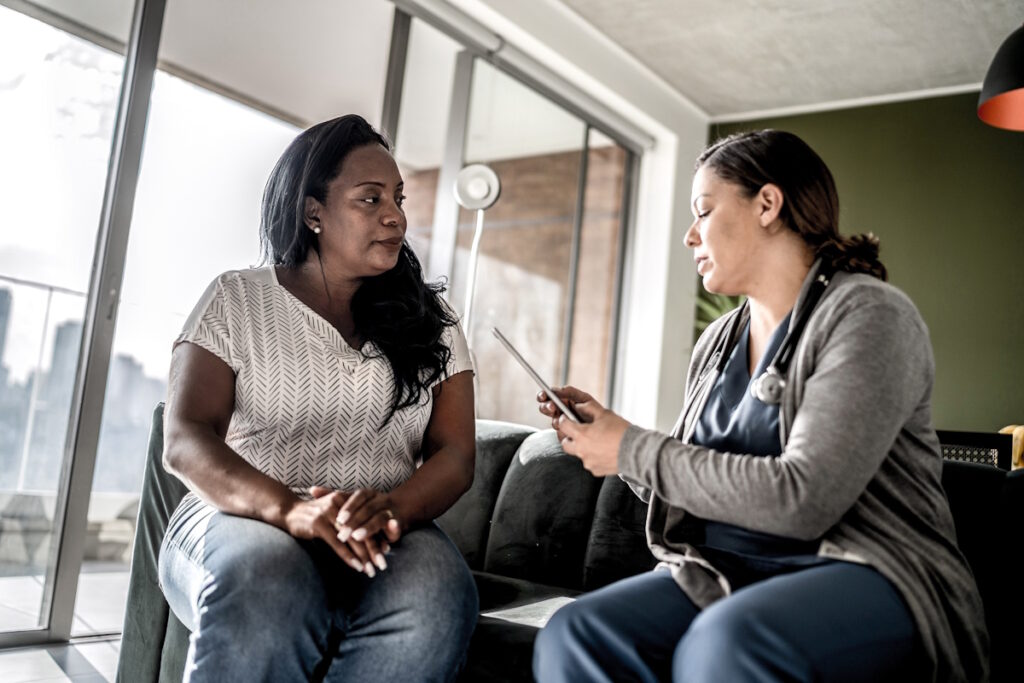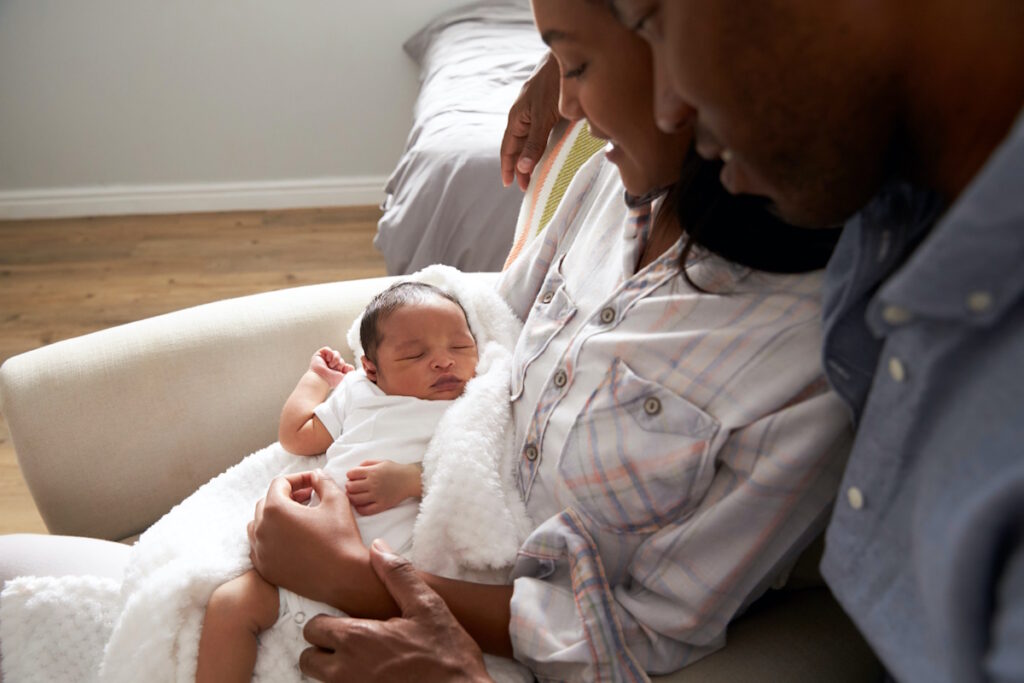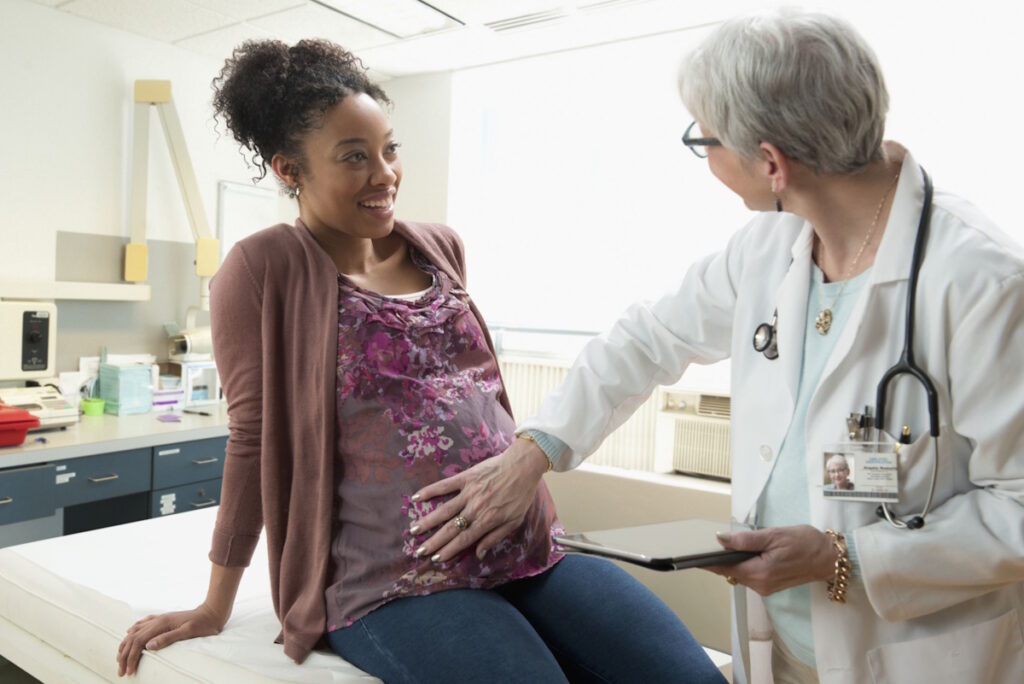Historically Black women have been at the forefront of conversations regarding uterine fibroids. This is not to say that only Black women have them. In fact, 70-80% of all women develop fibroids between the ages of 35 and 54. But there is a health disparity when you consider Black women develop fibroids earlier, grow larger fibroids and in greater numbers, and experience more severe symptoms. In recent years, the lengthy list of symptoms they experience has included a negative impact on their reproductive health—Black women are more likely to experience problems with pregnancy and delivery as well as alarmingly high rates of maternal health issues.
This isn’t to suggest that maternal health problems among Black women are only because of uterine fibroids. That said, a woman’s ability to enjoy a normal and successful pregnancy can be complicated further by the presence of fibroids, up to and including any of the following scenarios:
- Cesarean section
- Baby in breech
- Labor failing to progress
- Placental abruption
There’s no sugarcoating the fact that Black women suffer from a lack of fibroid relief because of non-comprehensive and costly treatment plans, minimal insurance coverage for scans, and harmful, invasive removals. For Black History Month this February, we’re shining a spotlight on uterine fibroids as a historically silent epidemic among Black women and how fibroids impact maternal health. If Black women with fibroids do not treat fibroids prior to pregnancy, any of the above issues may happen.
Maternal Health Problems Among Black Women Continue to Climb
The CDC and World Health Organization define maternal mortality rate as “the number of deaths from any cause related to or aggravated by pregnancy or its management (excluding accidental or incidental causes) during pregnancy and childbirth or within 421 days of termination of pregnancy.” According to an article published by The Century Foundation, a progressive, independent think tank that conducts research, develops solutions, and drives policy change to make people’s lives better, Black women are three times as likely to die from pregnancy-related causes as white women. In 2020, the U.S. maternal mortality rate was 23.8 deaths per 100,000 live births, with 861 known deaths due to maternal causes. In 2018, this number among Black women was 17.4.

What’s also striking is that the maternal mortality rate in the United States is nearly three times higher than that of France, the country with the next highest rate.
What does this have to do with uterine fibroids? Black women can struggle with natural conception because of fibroids. Additionally, risks of delivering babies in breech, deferring to cesarean sections, and delaying in labor are all increased by the presence of uterine fibroids, noncancerous tumors in the female reproductive system. Not only are they very common, but you may have one or several, all of which can differ in size. The symptoms can range from heavy and irregular periods to pain during sexual intercourse, back pain, pelvic pain and pressure, and more.
Though any woman can develop fibroids, they have a more dramatic impact on Black women in comparison to other races. The rate of hospitalization for fibroids is three times higher for Black women than white women. Black women are two to three times more likely to undergo a hysterectomy—thus ending their chances of having a baby in the future. Statistics show Black women are seven times more likely to have a myomectomy, which as a surgical procedure comes with surgical risks.
Concerning uterine fibroids, statistically Black women:
- Are diagnosed at a younger age (between 29 and 39)
- More often, have larger and multiple fibroids
- Experience fibroids that display faster growth
- Have fibroids that shrink slower after pregnancy (fibroids in white women shrink faster)
- Experience more severe symptoms (heavy bleeding, prolonged periods, cramping, etc.)
- Undergo surgery at earlier age (many times during childbearing years)
- Have more complications during surgery
The cards are stacked against Black women. And along with this is perceived racial discrimination in screening patterns, which if not discriminatory, would aid in early detection, proper access to care, and ultimately, less invasive treatment methods. According to the National Institute of Health, one review by a team of researchers at the Mayo Clinic showed that more than 75% of fibroid studies between 2000 and 2006 did not report the patient’s race, and most of the studies that did were those that were exclusively for Black women. Of the remaining studies that did report race, Black women only represented 15% of the studied population.
Undermining the process even more is that many Black women with fibroids appear to prefer to suffer in silence. A study published in the Journal of Women’s Health states that Black women take an average of almost four years to seek treatment. By this point, their symptoms are likely worse and their fibroids have grown in size and quantity—making treatment that much more difficult.
The study went on to say that Black women were also more likely than white women to view the fibroid information they did receive—either from physicians or off the Internet—as inadequate, requesting information such as:
- More data about fibroids in general
- Standard treatment options
- Alternative treatment options
- Consequences of treatment

UFE Can Reduce Fibroid Symptoms to Support Maternal Health
At Fibroid Institute Texas, we understand that for some women with uterine fibroids, a hysterectomy or myomectomy is the recommended treatment. However, we also know that hysterectomy or myomectomy is not the right fit for all women in every case—especially patients with more challenging cases and unique needs.
UFE (uterine fibroid embolization) is a highly effective non-surgical treatment option for women with symptomatic uterine fibroids. This includes women who are not candidates for a hysterectomy or myomectomy. UFE allows a woman to keep her uterus. Through a small puncture in the wrist, an experienced interventional radiologist uses a catheter to deliver tiny particles that block nonessential blood vessels leading to the fibroids, causing them to shrink or disappear.
With UFE, there is no bloody procedure and lengthy recovery times. In addition, you have a say over what happens to your body.
Benefits to UFE include but aren’t limited to the following:
- Alternative to surgery
- Shorter recovery period, 7 days in most cases
- No scarring
- Fibroid symptoms improve dramatically
- No hospital stay
- Pregnancy possible
- Tiny wrist puncture, no need for vaginal access
- All fibroids may be treated at the same time
- Covered by most major medical insurance
Our Fibroid Experts Care About Your Plans To Grow Your Family

Thousands of women visit Fibroid Institute Texas year-round to find relief from their fibroid pain and still have a chance to enjoy a successful pregnancy. We are happy to cater to those needs and offer UFE (uterine fibroid embolization) as a nonsurgical solution. At Fibroid Institute Texas, our doctors are board-certified interventional radiologists with 100% focus on fibroids and fibroid treatment.
At Fibroid Institute’s multiple locations in Houston and Dallas, we help thousands of women avoid fibroid surgery and find relief from their fibroid symptoms. Treatments are offered in the comfort of our offices equipped with advanced medical technology. Our office handles all orders for MRIs and diagnostic scans. We also manage all insurance pre-authorizations.
Most major medical insurance providers cover the cost of UFE. With multiple locations, our Houston and Dallas fibroid centers help thousands of women avoid fibroid surgery but find relief from their fibroid symptoms. Meet some of these women here:
We are dedicated to helping you become #FibroidFree. Get started now with Fibroid Institute Dallas at 214-838-6440 or with Fibroid Institute Houston at 713-903-3733 or complete the form below.
"*" indicates required fields
This information is not a substitute for professional medical advice. Prior to starting any new treatment or if you have questions regarding a medical condition, always seek the advice of your doctor or other qualified health provider.
Fibroid Institute Texas serves the Dallas and Houston areas including Addison, Carrollton, Plano, Frisco, Craig Ranch, McKinney, Allen, Fort Worth, Grand Prairie, HEB, Arlington, Hutchins, Irving, Duncanville, DeSoto, Cedar Hill, Lancaster, Cockrell Hill, Highland Park, University Park, Park Cities, Garland, Mesquite, Richardson, Dallas, Sherman, Houston, Sugar Land, Katy, Webster, Clear Lake, The Woodlands, Universal City, Spring, Kingwood, Stafford, Conroe, Texas City, Cypress, League City, Bellaire, and more.
*Patient stories are true. Names and/or photos may be changed to protect patient confidentiality.

